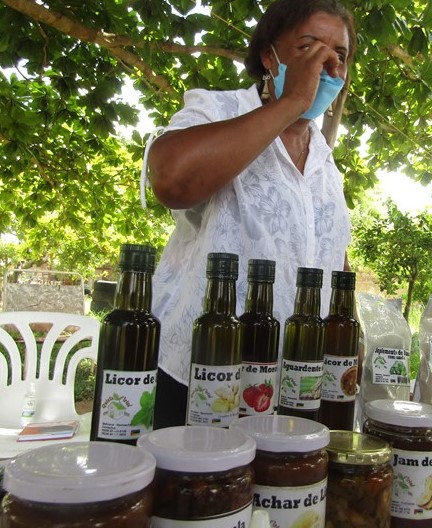
A Quinta Irini está em parceria com a UNIDO e o Ministério da Agricultura para a demonstração de sistemas integrados de energiais renováveis, em Mafiuane, Província de Maputo.No dia 15 de Fevereiro, a equipa TSE4LLM da UNIDO, 3 representantes do Ministério da Agricultura, e 1 delegado do departamento provincial de actividades económicas de Maputo visitaram a quinta de pequenos proprietários com o objectivo de obter mais informações sobre o projecto de demonstração da tecnologia das energias renováveis proposto. A equipa encontrou-se com a Sra. Malisa, a pequena proprietária da quinta que para além de destacar as actividades, sucessos e desafios da quinta, apontou também os possíveis locais dos 4 sistemas de energia renovável que serão implementados na quinta este ano. Neste artigo partilhamos convosco as perguntas e respostas da entrevista da conversa com Malisa.
P- Quais são os principais impactos do projecto irini até ao momento?
R- Estamos empenhados na agricultura, na rarefacção de animais e na agro-processamento. Os nossos produtos são vendidos em supermercados e feiras comerciais moçambicanas. A quinta apoia 5 agricultores (4 mulheres e 1 homem) que trabalham directamente com a quinta para cultivar culturas e apoiar no processamento de artigos agrícolas como chá, mel, cogumelos, e etc.
P-Que desafios enfrenta?
R- Como pode ver, todas as nossas actividades precisam de água e energia. Sem água não podemos praticar piscicultura, irrigar culturas, e processar produtos alimentares. Na estação seca como esta, a maioria das culturas pereceu devido ao fornecimento limitado de água.Costumávamos bombear água em latas de 1000 ml e mais tarde utilizá-la para irrigação, mas isto não era sustentável porque o sistema utiliza diesel que é muito caro e de difícil obter numa área remota como Mafiuane. Além disso, a produção de cogumelos requer a utilização de grandes quantidades de madeira e isto afecta o ambiente.
P- Como irá o apoio da UNIDO ajudar a enfrentar estes desafios?
R- O apoio da UNIDO ajudará a resolver o problema dos recursos limitados de água e energia e, portanto, produzir mais e fornecer não só à comunidade mafuiana mas também à província de Maputo. Temos actualmente 5 trabalhadores mas o novo projecto permitir-nos-á empregar mais pessoas, especialmente mulheres desta comunidade.
P- Qual é o impacto da Quinta Irini na comunidade?
R- Empregamos pessoas para apoiar o trabalho e ganhar um rendimento para sustentar as suas famílias. Há também a formação de alguns membros interessados da comunidade em métodos agrícolas modernos, processamento, conservação e embalagem de alimentos de qualidade.
P-Que tecnologia de energia renovável pretende utilizar e porquê?
Os fundos da UNIDO facilitarão a concepção, aquisição e instalação de um digestor anaeróbio de 8kW de capacidade (25 metros cúbicos) para a produção de biogás, máquina de moagem solar de 2,2 kW, sistema de bombagem solar de água de 1,2 kW para irrigação, e secador solar de alimentos de 4,3 kW de capacidade para 1.000 kg de frutas para o processamento de frutas.
UNIDO finances a renewable energy project in Tsangano district that will benefit over 250 households
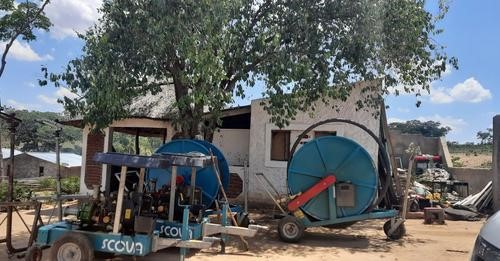
In November 2021 Tsangano Agrifarms LDA, an agribusiness company from Tete province became the second recipient of funding under the auspices of the BCI SUPER credit line implemented by BCI bank in partnership with UNIDO and FUNAE with funding from the Global Environment Facility (GEF), to install a 6.0kW solar photovoltaic system. The company is devoted to a diverse range of productive activities in the farm including agricultural production, agro-livestock, and agro-processing within 101 hectares of land in the Tsangano District, in Chinvano locality.
“Tsangano Agrifarms is an ambitious and credible project that contributes enormously to the development of the community. Besides the production of agricultural products, Tsangano Agrifarms is engaged in other productive activities like bee keeping, piggery, and fish farming. The company is enlarging its production, providing employment to the community thus increasing income generation opportunities”, said Mr. Geraldes José Mafumba, District Economic Activities Service Department, Tsangano.
Like other agricultural practices in Mozambique, the Tsangano Agrifarms activities depend on the increasingly dwindling water resources from nearby rivers and the rainy seasons to irrigate the farms and cater for poultry and animal husbandry.
“Due to climate change, we do not have abundant water for our own consumption and the irrigation of our fields. We have a nearby river, Rio Nhacuawa that flows only in the rainy season and whose water flow tends to reduce in the months of April-May” – lamented a Tsangano small holder farmer
In order not to suspend the agricultural activities due to water scarcity, the company resorted to pumping water from Liveranje River, which is 1.8km away. However, this requires significant investments that had to be made for the acquisition of motorized water pumps and piping of large capacities which makes operational costs very high for their level of production. “In the past we depended the old the water pumps whose engines function with diesel which is so costly and hard to maintain. The cost of maintenance is very high due to the fact that their spare parts are not existing in the Mozambican market”- Melody Stewart Dindingue, Tsangano Agrifarms CEO
With the support of the BCI SUPER credit line, Tsangano Agrifarms intends to use a photovoltaic system to harness the sun's energy to pump water to irrigate crops, power agricultural machinery and equipment, provide light, heat, and ventilation to farm buildings, haylofts, pigsties, livestock and energy for cooling in the horticultural processing factory and freezing in the abattoir chamber. Irrefutably, the operating costs of the company will reduce considerably due to the adoption of renewable energy systems compared to the fossil fuel powered equipment that is currently in use.
“We are going to install a solar submersible pump and assemble solar panels facing the sun to enable the pumping of water for irrigation of over 30 hectares of crops compared to the previous 10 hectares”- said Melody Stewart Dindingue and added “In addition, the photovoltaic systems also require much less maintenance compared to traditional agricultural energy sources and are very efficient. Greenhouse nurseries, for example, will allow crops to grow all year round. Solar energy will also be able to dry crops faster and more consistently compared to other methods.
Previously the agribusiness company used a diesel-powered mill to grind over 500 kgs of maize using 20 liters of diesel daily which is very costly and inaccessible due to the lack of petrol stations in the district to enable the purchase of the same. According to the company’s CEO installing a grinding mill that uses solar power is going to be of great advantage as it will not depend on expensive diesel. “The new solar powered grinding machine will have the capacity to produce 1000 kgs of maize flour per day”, said the Company’s CEO.
The Tsangano Agrifarms solar photovoltaic system with funding from the BCI SUPER credit line will enable crop production throughout the year, maize grinding benefiting 250 families (equivalent to 600-800kg of flour per day), and increase poultry and piggery production from the current 79 to 600 per year.
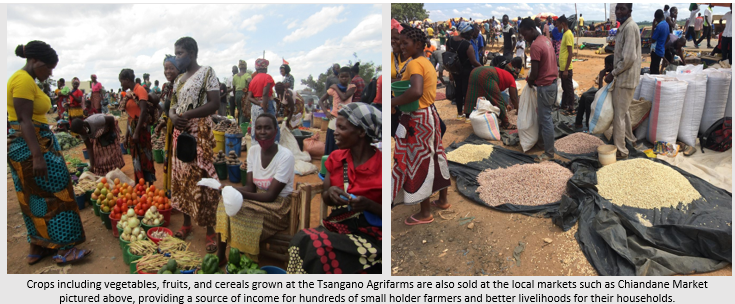
Besides increasing production, the solar system will enable the use of better heating and lighting methods that are not detrimental to the environment. In the past the warming of poultry houses was done using firewood, a practice quite detrimental to the environment, but with the solar-powered system, solar panels and inverters will be placed on top of the poultry houses to offer lighting and heating to the birds.
Above and beyond the solar photovoltaic system for irrigation, Tsangano Agrifarms will venture into other uses of renewable energy like biomass owing to abundance of animal and crop waste in the company’s farms. “The chicken and pigs waste have significant methane content relevant for the generation of biogas when decomposed” Mr. Vicente Matsinhe, National Coordinator, TSE4ALLM project, UNIDO
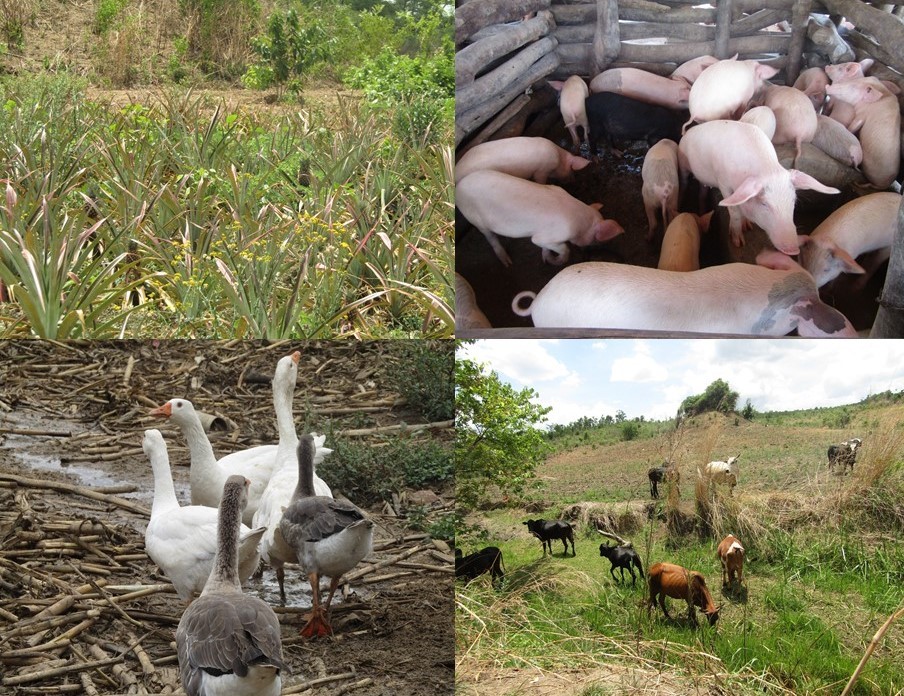
“The fund received from UNIDO will cover our needs as regards to enabling the irrigation of crops throughout the year using the solar photovoltaic system, hence more production. It is expected that in a period of 1-year Tsangano Agrifarms will employ over 150 community members” stated Mr. Melody.

“The coming into force of the regulations is timely! It is an instrument that will change the energy sector as the whole society is awakening and realizing the potential of energy for the whole country and at the same time a great incentive for the private sector in terms of boosting the generation and distribution of energy” - Vicente Matsinhe, National Coordinator, TSE4ALLM project
This regulation was published on December 10th after being formally approved in Sept 14th by the board of ministers and according to the rules it will be enter into force 45 days after publication. The regulation was developed as a response to strengthen the current legal framework of the energy sector to accelerate access to energy in off-grid areas with a particular emphasis of boosting productive uses of energy and related socio-economic development across the country.
Undertakings that fall under the investment regime defined by this regulation include initiatives aimed at improving access to energy in off-grid areas, which create and use virtual physical infrastructure or systems, installations, equipment, software and other accessory components, essential for access to energy, catalysts for the development and exploitation of industry, commerce, fisheries, agriculture, and other sectors of activity.
Going forward and as a result of the enforcement of this regulation, the private sector will be more attracted to invest in renewable energy particularly in mini-grids which have now been segmented and classified according their respective installed capacities as follows:
a.Category 1: Minigrids with installed capacity ranging from 1.001 MW – 10 MW
b.Category 2: Minigrids with installed capacity ranging from 151kW – 1 MW
c.Category 3: Minigrids with installed capacity up to 150kW
Under the TSE4ALLM project, given that the project is targeting small to medium size installations, it is expected that most of the systems will fall under category 3 which are exempt from the obligation to obtain the establishment and exploration licenses, without prejudice to any of the duties of the investor pertaining system operation and maintenance and for the respect of the principles and standards of quality, safety and reliability as well as of the respective inspection by the Regulatory Authority of Energy (ARENE).

On 29th November 2021 United Nations Conference on Trade and Development (UNCTAD), the United Nations Industrial Development Organization (UNIDO) in Mozambique with support from the Office of the United Nations Resident Coordinator in Mozambique organized a Round Table under the theme : "Promoting economic diversification and sustainable livelihoods through the circular economy" as a contribution to the implementation of the National Industrialization Policy (PRONAI) and the National Development Strategy (ENDE).
The Round table focused on the role of the local, circular economy and blue economy local value chains in reducing economic vulnerability (as per the theme of UNCTAD 15), increasing economic diversification and promoting sustainable livelihoods, aligned to the UNSDCF Strategic Priorities 2 and 3, the National Industrialization Strategy, and the National Development Strategy.
“UNIDO is engaged in increasing knowledge about the potential of the circular economy as a way to promote economic diversification and sustainable livelihoods that will contribute to the design of the National Development Strategy (ENDE) and the implementation of the National Industrialization Policy (PRONAI)”. Mr. Jaime Comiche, UNIDO Country Representative
It should be noted that after decades of high GDP growth averaging 7% per annum up to 2014, Mozambique’s economy has in the recent years slowed down to rates of GDP growth below population growth. As a result, GDP per capita has been falling for the last few years. Maputo City alone saw a 38.1 percent drop in per capita spending. In addition, the country has also regressed in terms of the Human Development Index, becoming the 181st least developed country among the 190 countries listed by the Human Development Index. Besides poor industrialization, factors such as conflict, natural and man-made disasters, and the Covid-19 pandemic, among others, have also contributed to the economic deterioration.
This dramatic decline in economic resilience combined with the increasing climate-related risks further heighten Mozambique’s vulnerability calling for an urgent strategic, whole-of-Government and whole-of-society effort from all economic and social agents to bounce beyond its current vulnerability building economic diversification and resilience.
Against this backdrop, in late September 2021 the President of the Republic launched the consultation process for the revision of the National Development Strategy (ENDE), the apex of national planning and budgeting architecture.
The revision of the ENDE constitutes and opportunity to support the consultation process hosted by Ministry of Economy and Finance and to support the Ministry of Industry and Trade and Business Associations (particularly those representing MSMEs, Women and Youth Entrepreneurs) to ensure their voices are heard so that ENDE places a much-needed emphasizes on building sustainable livelihoods and enhancing productive capacities in line with the focus of UNCTAD 15, reducing inequalities and vulnerability towards enhanced productive capacities.
“(Programa Nacional Industrializar Moçambique) PRONAI an embodiment of the ENDE, is one of the national programs that foresees, within a period of approximately 10 years, the promotion of 293 industrial development projects which intends to industrialize the country and promote thousands of jobs for Mozambicans”. Cerina Musa, representative of the Ministry of Industry and Commerce
It was also highlighted that certain business practices and broad strategies including reusing, repairing, remanufacturing and recycling s are necessary for reaching a circular economy "A circular economy returns products to the economy and maintains the value of each product as long as possible" - Ms. Nilgüen Tas, UNIDO - United Nations Industrial Development Organization Deputy Director, Department of Environment
The event was attended by participants from institutions and organizations relevant to the diversification of the economy, such as: The Ministries of Industry and Trade, Agriculture and Rural Development Lands and Environment, Energy and Mineral Resources, Economy and Finance; business associations, including but not limited to CTA, ACIS, IMO, and small-scale producer associations, ensuring through these that MSMEs, gender and youth representation is ensured.
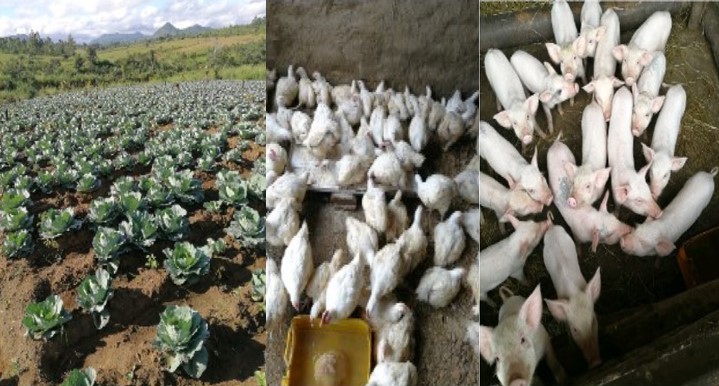
In November 2021 Tsangano Agrifarms, an agribusiness company from Tete province received funding under the auspices of the BCI SUPER credit line implemented by BCI bank in partnership with UNIDO and FUNAE with funding from the Global Environment Facility (GEF). Tsangano Agrifarms is an agricultural production, agro-livestock, and agro-processing company, owner of 101 Hectares of land in the Province of Tete, Tsangano District, in Chinvano locality.
Currently the project is involved in the production, processing and commercialization of quality agricultural products using the most modern technologies and production processes available in the district and at the country level.
Like other agricultural practices in Mozambique, the Tsangano Agrifarms activities depend on the increasingly dwindling water resources from the nearby rivers and rainy seasons to irrigate the farms and cater for poultry and animal husbandry.
“Due to climate change, we do not have abundant water for our own consumption and the irrigation of our fields. We have a nearby river, Rio Nhacuawa that flows only in the rainy season and whose water flow tends to reduce in the months of April-May” –Lamented a Tsangano Agrifarms staff member
In order not to suspend the agricultural activities due to lack of water, the company resorted to pumping water from Liveranje River, which is 1.8km away. However, this involves a lot of expenditures as regards to the acquisition of motor pumps and piping of large capacities of water which makes it more expensive for their level of production.
“Despite the fact the river Liveranje supplies water for longer periods compared to other rivers, it is difficult to practice agriculture on the banks of the river due to the steep slopes. Besides, the river is prone to soil erosion on its banks as a result of intensive agricultural activities”—Informed the Tsangano Agrifarms staff member
With the support of the BCI SUPER credit line, Tsangano Agrifarms intends to use a photovoltaic system to harness the sun's energy to pump water to irrigate crops, power agricultural machinery and equipment, provide light, heat, and ventilation to farm buildings, haylofts, pigsties, livestock and energy for cooling in the horticultural processing factory and freezing in the abattoir chamber. Irrefutably, the operating costs of agriculture and horticulture farms will go down considerably compared to the fossil fuel powered equipment that is currently in use.
“The solar strategy will help us increase efficiency and self-reliance. Solar technology will offer us an opportunity to stabilize our energy costs. Some solar strategies involve an upfront investment, but when those costs are recovered, the energy is free”. Informed the company’s CEO
In addition, the photovoltaic systems also require much less maintenance compared to traditional agricultural energy sources and are very efficient. Greenhouse nurseries, for example, will allow crops to grow all year round. PV panels will also be able to dry crops faster and more consistently compared to other methods.
The Tsangano Agrifarms photovoltaic system with funding from the BCI SUPER credit line will enable crop production throughout the year, maize grinding benefiting 250 families (equivalent to 600-800kg of flour per day), and increase poultry and piggery production from the current 79 to 600.

